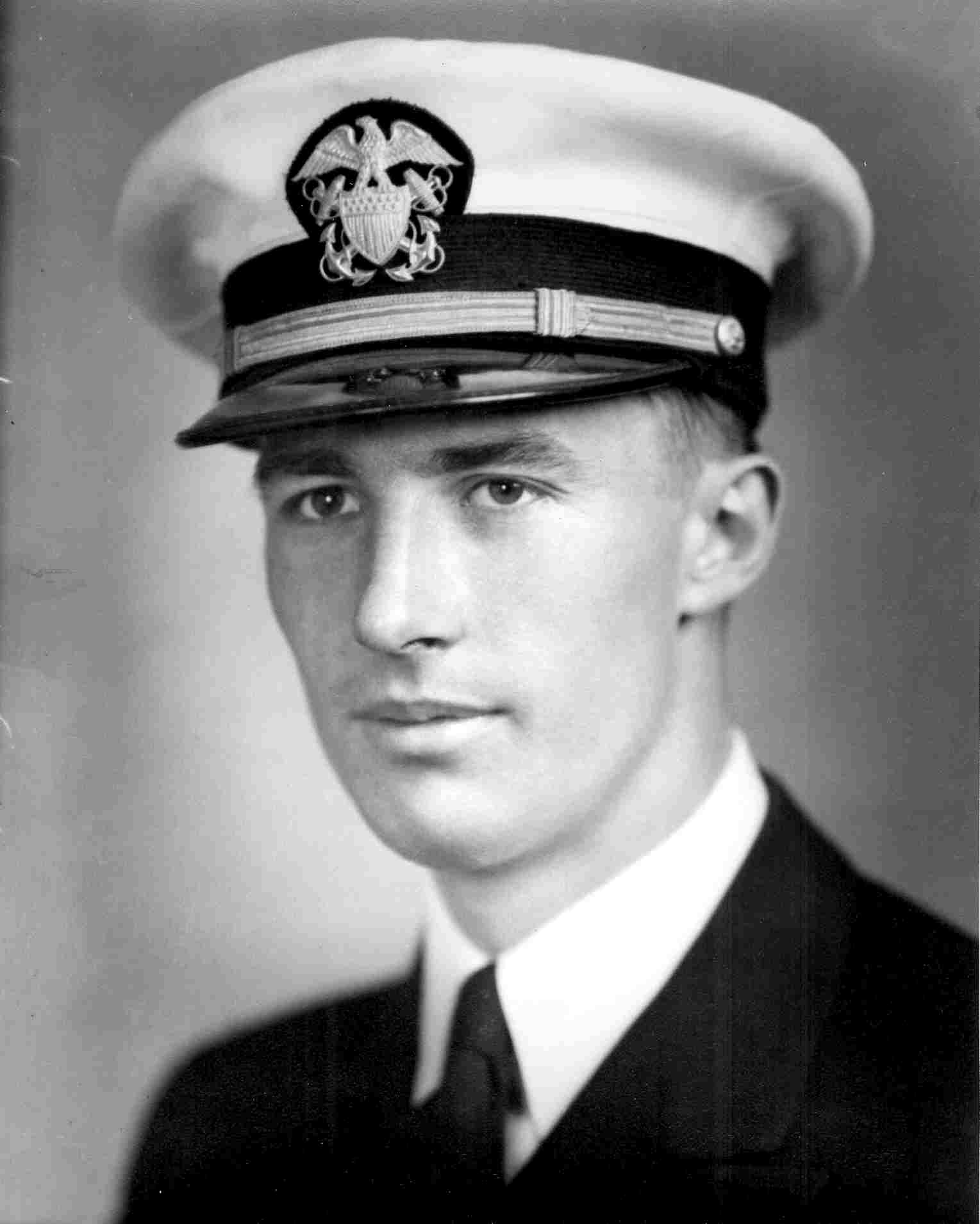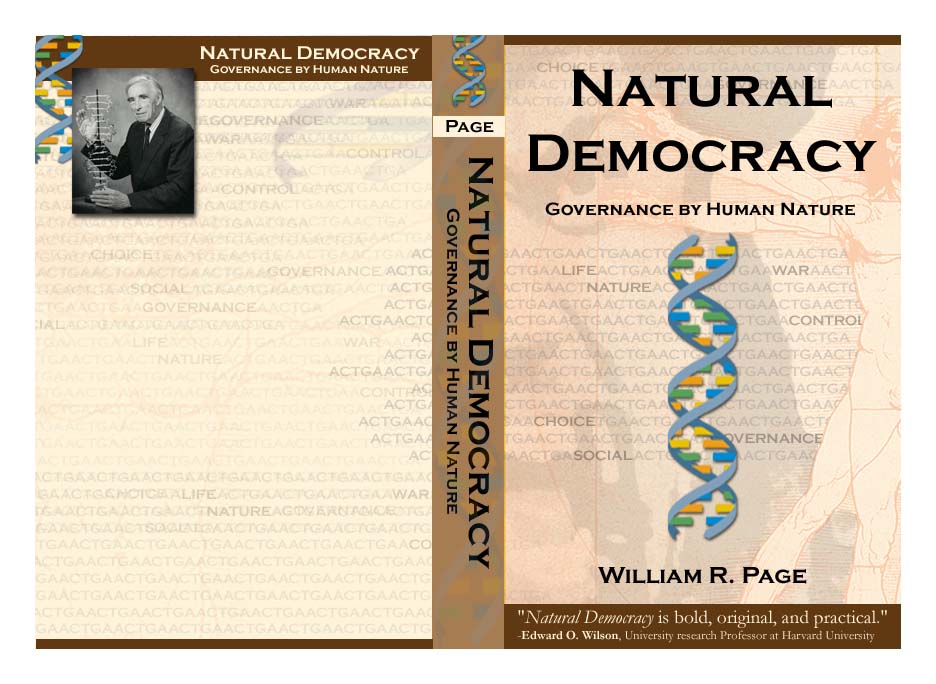
Natural Democracy
Natural Democracy by William R. Page


Natural Democracy by William R. Page

| Chapter 1 OUR GENES: THE PROBLEM, THE SOLUTION, AND THE OPPORTUNITY In the Fall of
2000, I asked one of my grandsons to build a 2 foot high model of the
double
helix, the human genome. (Ridley 1999) I brought it down
from
northern Vermont to Lexington, Massachusetts, and set it on top of a
grand
piano in the meeting hall of First
The Double Helix I said to the people who gathered around it: "The chemicals which make up the human genome are controlling your feelings and behavior. They control our human nature. They are the same chemicals that were controlling the people who founded this church and started the American Revolution on the morning of April 19, 1775." I had a copy of this book in my hand and continued. "This book is about the start of another revolution. It is about how to use these chemicals to reach the freedom that comes with knowing how they function. It's about how to be conscious of how these chemicals are now controlling you and me and everybody else. It's about how to decide how you want these chemicals to be controlling you. And it's about how to help and lead in bringing about increases in effectiveness of democracy by taking control of how these chemicals control us. It's about practical ways that my colleagues and I have found in actual tests of natural democracy and governance that proved to us it will work" The chemicals of the double helix are the genes. The assemblage of them into all of the double helixes in all the cells of our body is called the genome. Our human genome controls our feelings and behavior. Now we know enough about how it works so that we can take control of ourselves. The revolution this knowledge allows is that we can now decide what feelings and behaviors we want our genes to induce. This will give us a really true freedom. We are not proposing to change human nature; rather we propose to co-opt it. Using the new knowledge, we can make progress toward great goals that have been elusive heretofore. They include the achievement of peace and happiness for all humankind. These goals have evaded us because we haven't understood until quite recently how our genes work. We can improve our democracy by taking our genes into account. I put my life on the line in World War II. I did it as many veterans did -- to preserve democracy. We had to kill in order to do it. Without realizing it, I was under the control of these genes when I did this killing. We veterans of that war have often cried out "Never again! The world doesn't need to be doing this to itself." With more accurate understanding of our genes that cry can become a reality. We can clean up the mess caused by automatic control of us by our genes: such as war; crime; violence; and all the suffering of children. The understanding of the new freedom to be in control of our genes opens up the possibility of becoming all that we and our children can be. To articulate the challenge: can we, all humanity, develop a form of governance that helps us to achieve this new form of self control? Can we create a natural governance and natural democracy, with the potential for helping us achieve better lives for ourselves and each other? In February of 2001, the world was given a window on our genes, on humanity's genome. (Nature, February 15, 2001 and Science , February 16, 2001) Through that window, scientists have looked at the genetic structure that has led to humanity's current overbearing domination of the earth. (Ref: Svante Paabo, Genomics and Society: the Human Genome and Our View of Ourselves). The view changes the way we think about ourselves and who we are. These parts of
the genome are lined up in long chains called chromosomes. The chemical
line-up within each chromosome is called the human genome sequence.and
is sometimes referred to as DNA Many parts of
each
chain have an influence not only on how we develop, or to which
diseases
we are susceptible, but on the very ways we behave and how we
feel.
The genes influence our feelings and behavior under certain
conditions.
They do this by programming the chromosomes to make copies of
themselves
(actually making a copy of one of the two strands of the double
helix)
These copies make proteins which in turn instruct the chemical
reactions
in various parts of our body, including our muscles and nerves.
Muscles,
nerves, and other parts are at one end of this serial process which
controls
the ways we feel and behave. Care has to be exercised in using the word
control. Human behavior is not solely genetically determined. Our
physical and social environments have strong influences on feelings and
behaviors.
MY JOURNEY With this priceless tool, this gift to humanity, can we discover how to put it to work for us? Even before the recent scientific breakthroughs, I had that challenge on my mind. I came back from World War II with the feeling that I had been lucky to have lived through it. I felt that whatever happened next would be grace; I could use my time for anything. What did I want to do with my life? I started a search into what do we humans want to do with life? My instinct said that once we know the answers to those questions individually and together we'll find ways to get along better in the world. My father had died of tuberculosis when I was six. Two years later a cure was found for that disease. I wondered if there can be a cure for war. To develop this thinking, I decided to learn more about human nature. What is there about our nature that is keeping us, humanity, from reaching our full potential, from reaching great goals? One obvious example is our instinct to kill. What hadn't been obvious to me until recently is what to do about that instinct. In the study of the genome, there are hints showing up about causes of aggression. (McGuffin, Peter, Brien Riley, and Robert Plomin, Genomics and Behavior: Toward Behavioral Genomics Science, Feb. 15, 2001) But, for now, the most productive route appears to be suppression of the instinct through natural democracy, which combines evolutionary traits with design of governance processes. Suppose we were to say that one thing we want to do with life is to reach great goals -- such as becoming all we can possibly be and helping our children become all they can possibly be. What is getting in the way of achieving such great goals? My instinct may turn out to be right. In the light of the new information about our evolutionary history, we can understand much of the history of life in the past. Perhaps we can refine the question to: "What do we want to do with life as it continues to be influenced by our genome?" What I've come to realize is that we, all of us in the world, have the option of moving from being controlled by our human nature to being in control of our human nature, if we understand that nature. When I killed all those people I was being controlled by human nature. Most of the research that is opening up the option of being in control of our human nature has been going on only within the last fifty or so years. (References: Wrangham, Richard and Dale Peterson (1996) Demonic Males; the Origins of Human Violence. Houghton Mifflin; Ghiglieri, Michael (1999) The Dark Side of Man; Tracing the Origins of Male Violence. Helix Books; Buss, David M.(2000) The Dangerous Passion; Why Jealousy Is as Necessary as Love and Sex. The Free Press; Fisher, Helen (1999) The First Sex, the Natural Talents of Women. Random House; Buss, David M.(1999) Evolutionary Psychology; the New Science of the Mind. Allyn & Bacon; Jolly, Alison (1999) Lucy's Legacy; Sex and Intelligence in Human Evolution. Harvard University Press; Daly, Martin and Margo Wilson (1998) The Truth About Cinderella; a Darwinian View of Parental Love. Yale University Press; Burnham, Terry and Jay Phelan (2000) Mean Genes; Taming Our Primal Instincts. Perseus Books.) For example, Burnham and Phelan in Mean Genes open up the option for each of us to take control of our human nature. Burnham and Phelan point out that our minds come with no explicit operating instructions for us to use. The structures of our minds are designed and operated by our genes. These authors are right that genetic operation gets us into trouble a lot of the time. We need to give our minds explicit operating instructions. We do this by taking over the implicit operating instructions of our genes. We have the option of moving from automatic pilot by our genes to self piloting, giving explicit instructions to our genes. We can do this by deciding which genes, which epigenetic rules, we want to put into operation to control our behavior and emotions at any given time. Burnham and Phalen give examples of behavior and emotions that allow us to lose weight, put money in the bank, or mend neglected relationships. The book you are reading now shows how to take that hard won understanding of human nature into account by using it to be conscious of that nature as we govern ourselves. Appropriate names for this form of governance would seem to be natural democracy or natural governance. Governance which comes naturally to us because we design it to elicit the better parts of our human nature. Democracy is a government in which the power is vested in the people and exercised by them directly or indirectly through a system of representation involving periodic, free elections. Democracy puts people in control. It provides the opportunity for Natural Democracy if we decide together we want it. The basis for natural democracy and natural governance is reciprocal altruism defined as mutually beneficial exchange relationships or transactions. (Trivers, R. L. (1971). The evolution of reciprocal altruism, like all epigenetic rules, occurred because of its utility. (Quarterly Review of Biology, 46,35-57). Even though Trivers intended the definition to apply to non-kin, there are times when it has utility in kin relationships as well. (For example, when George W. Bush signs certain types of legislation, his father benefits also.) When referring to reciprocal altruism, I will use the shorter term, reciprocity throughout this book. My colleagues
and I have tested the conditions under which governance and democracy
function
to mutual advantage We have tested natural governance at
several
levels: governance within the family; governance within the community;
governance within the state and the nation; and lastly, governance in
the
world.
These tools
are
the steps in the process of discovering natural democracy. Chapter 2
provides
more information on our experience with these techniques of governance.
|